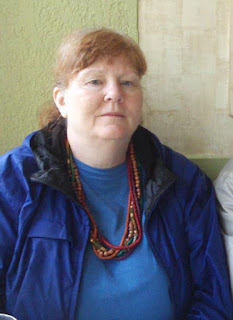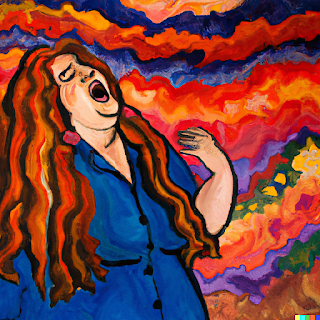Summer: The Unruly Bodies
In
her memoir Hunger, Roxane Gay refers
to the fat body as being “unruly,” suggesting an out-of-control vessel that
does not know how to not eat and takes up more space than should be allowed.
I
would contend that the human body, in general, is unruly.
No,
I have never been obese enough to not fit into ordinary chairs with arms.
I
have never had to buy two seats on an airline, nor have I ever requested a
seat belt extender – although I have been uncomfortable and tight in my single
airline seat.
I
have never worried about breaking furniture, although I have had some tight
fits in restaurant booths, but never to the extent of asking to be moved to a
table.
I
have never been immobile because of my weight, nor have I ever needed an electric
scooter or a riding grocery cart.
Washing
my own body has never been overly difficult, although I did experience
under-boob sweat, rubbing thighs, cheesy curds among rolls of fat and even in
my “innie” belly button, and smelly feet (I still have this problem at times).
Sweat,
for a fat person, is ever-present, no matter the season; no amount of
antiperspirant can fully protect the armpits, and sprinkling powder between our
thighs, among our rolls, under our boobs, and on our feet offers just a temporary
stopgap and virtually no respite from the cheesy curds.
In
summer, we dread the heat and crave air-conditioning, and yet the icy air
clings to our sweat like a wet towel – more sweat and clammy damp clothes, so
we vacillate between hot flashing and freezing.
In
winter, we are the ones who have shed their winter coats and go outside in
tee-shirts and, sometimes, shorts. Even in extreme cold, we tend to layer up,
our winter coat just a hoodie.
In
winter and summer, we keep our houses cold.
My
thin version requires no powdering – just a good, thorough, towel drying – though
during exercise on a hot day, I still sweat, but in a normal manner in that
when I’m no longer overheated, I stop sweating.
A
fat person sweats all the time: summer, fall, spring, and winter, rain, shine,
or snow.
The
thin me has come to dislike artificially cooled air – a lot. Today, as I write
this part of my book, it is 85 degrees outside with moderate humidity. Earlier,
the window-unit air-conditioner, right behind me, was on energy-saver mode. I
could no longer stand the cold air blasting me.
I
had to turn it off.
To
move the air around a bit, I dug out an old fan.
The
fat me would have that air-conditioner cranking out icy air at full blast.
My
fat has been the cause of a lopping gait, which persists even now; apparently,
my body does not know how to be not fat.
On
foot, my fat self has been out-of-breath, tired, and sweaty, while my nimble husband,
nine and a half years older and whose heart is working at only 75% capacity,
moves like a lynx, unsweaty and unconcerned.
So,
yes, an obese body is unrulier and
more difficult to manage and maintain than the normal body.
But
thinness has its unruliness as well.
Psychologically
and physically, while the fat body offers its owner a kind of armor, the thin
body feels and is exposed. As my body has diminished, I have lost nearly all
the fat on my chest bone – that feels scary.
In
a practical sense, driving a car or riding in the front passenger seat feels a
bit risky; I never felt such a fear as a fat person, but it now borders on an
obsession. Could the airbag break my breastbone and drive its shards into my
heart?
As
a thin person, I have to double check to make sure my seat belt is, in fact,
clicked. As a fat person, this was never a problem – the tight crossover belt
was a noticeable reminder.
On
my daily walk, could my lopping gait cause me to trip and fall, breaking a leg
or an arm? A distinct possibility, given my recent Osteoporosis diagnosis.
Speaking
of my Osteoporosis: did I contract this condition because of my fairly rapid weight loss of 65 pounds in a year? Or
was my fat simply masking an already-existing condition?
Am
I eating enough and getting proper
nutrition? This may seem like an odd fear, but eating fewer calories can cause malnutrition. I ingest about
1,500 - 1,800 calories a day and try to balance protein, green vegetables,
fruits, and, yes, starchy vegetables, but I sometimes work in some junk food at
part of my calorie/point allotment.
I
feel as though I am eating enough – I rarely experience true hunger. (Cravings
are a different matter and have very little to do with physical hunger.)
I
take vitamins, probiotics, Q-10 (for leg cramps), and calcium each day. I wonder
if this regimen – in conjunction with my diet – is good enough.
But,
other than the Osteoporosis diagnosis, my thin body offers up excellent
numbers: perfect cholesterol numbers, low blood pressure, blood cells in
acceptable ranges, normal thyroid and sugar levels.
To
be fair, my fat body numbers aren’t all that bad; I am one of those fat bodies
that seems to defy conventional medical wisdom about obesity. The fat version
may have slightly elevated blood pressure, but all the other numbers hum along
just fine, fat or thin.
In
March 2016, my fat body was prescribed two nights (at different times) at the
sleep lab because obesity (mild or otherwise) is a risk factor for sleep apnea,
and I had complained of not sleeping well.
On
night one, technicians placed electrodes all over my body: head, chest, feet,
fingers.
I
resembled a Borg drone in a worn green nightgown from Atlantic City.
Have
you ever tried sleeping in such a get up?
Somehow,
I did, because they woke me up at 5:30 a.m. and sent me home – well, with a
stop on the way to a diner, where my husband and I ate the largest breakfast of
our lives.
I
didn’t hear back for about a week, so I assumed that all was well.
Wrong.
Long
story short: I was called back to the lab because I had been diagnosed with
moderate sleep apnea and needed to be fitted for a mask and my CPAP pressure
determined. I was once again wired up, only, this time, I also had to wear a
mask, which I found claustrophobic.
I’m
pretty sure I didn’t sleep well, but somehow, they were able to hone in on my
proper CPAP pressure: 11 (six being low and 20 high).
I
reveal this because my body would still be fat without this diagnosis – after the big (and failed) diet of 2011, I had decided to forget about losing weight, ever again.
Fast
forward to Summer 2017; I am still on the CPAP, but at a varying pressure of
six through nine.
Wouldn’t
it be cool to be seven through nine – “seven of nine”?
In
August, it is likely my thin body will be tested, but using an at-home kit because
non-smoking thin bodies are supposedly at lower risk for sleep apnea, and
Medicare doesn’t care that I have already been diagnosed.
It
will not pay for sleep lab time, admittedly very expensive.
I
suppose there are some perks to being fat.








Comments